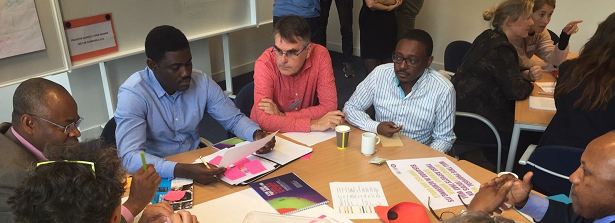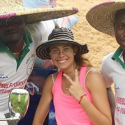SES4Food Meet-up 2: Co-designing the business plan

On September 29, 2017, a group of committed professionals were engaged in a dialogue about how the Social Entrepreneurship Support for Food Security (SES4Food) initiative could be organized and should cooperate with other entrepreneurial and food security programmes. This second meet-up has shown that there is an urgent demand for the unique SES4Food bottom-up approach. The participants also expressed their dedication to continuing investing time and knowledge in SES4Food’s next step: setting-up a prototype. Read the full report here.
A group of 15 international professionals working in social entrepreneurship and/or food security in low- and middle-income countries gathered to co-design the business plan for the SES4Food initiative at the headquarter of Oxfam Novib in The Hague. (See more information on SES4Food in the BOX below). Where the first meet-up, which was organized in July this year, had the objective to discuss the opportunities of, added value of, and the needs and purposes for SES4Food, this second meet-up made it possible to concretize it all in an operational plan and business model.
Making your work lighter and more effective
During the meeting, led by Ard Hordijk, the multi-stakeholder group told how and where SES4Food could make their work lighter and more effective. They pin-pointed on a world map where they would like to see SES4Food to become operational, which was overwhelmingly in West-Africa and Eastern Africa. They also pin-pointed where in the ecosystem SES4Food should focus its activities by discussing how the initiative could make synergies with their existing programmes. For example, Oxfam Novib would like to see SES4Food work with them “to connect the dots and find alternative ways that could release the energy and potential of young entrepreneurs”. And the Netherlands-Africa Business Council (NABC) wants to “have a better understanding about more creative approaches for inclusion that could suit Dutch companies”.
In general, the participants expressed that SES4Food could make the difference for them by working directly with those social entrepreneurs that are currently overseen by support organizations. Providing an intense coaching and quality support system is needed that does not focus on quick wins, but on the establishment of a lasting dialogue. The participants also recognized that such dialogue should merely focus on mechanisms to create impact on the entrepreneurial ecosystem, for example with access to alternative resources for investment and knowledge.
Stimulating trust, inclusion and co-creation
The second part of the day was dedicated to the positioning of SES4Food by looking at several models that could be used to design a Theory of Change. This discussion led to very valuable feedback and put on the table some very delicate and interesting issues. At the same time warnings were mentioned not to let SES4Food disconnect from its unique bottom-up approach focusing on social entrepreneurs in food security, which “works from the people’s perspective and embraces different cultures and ideas”, as one participant expressed. For example, one sub-group mentioned that “social entrepreneurs should not assimilate to the mainstream, but the mainstream has to embrace the alternatives that social entrepreneurship offers them.”
The last session was a fruitful discussion about the earning model, legal status, organizational framework and the steps needed to start prototyping the concept of “Communities of Action”. Again, many ideas and suggestions were exchanged. For example, on who owns the solution that comes out of the Community of Action and if that solution could be money-driven and/or problem-driven. Other issues that were raised were about the difficulties to build an earning model around membership fees only, not to turn a blind eye on philanthropy, and to include the diaspora.
What next
Each participant expressed his or her specific interests to continuing investing time and knowledge in SES4Food. They specified what roles they could play in the further build-up of SES4Food. Their input will be used for the preparation of a final Terms of Reference, operational plan and business model for SES4Food that will be presented in the following months along with a concrete plan to prototype SES4Food in one or two countries.
Both meet-ups were made possible with support from the F&BKP. For any information about SES4Food, please contact Vanessa Nigten at the Food & Business Knowledge Platform (vanessa.nigten@knowledge4food.net).
- Read here the report of the first meet-up held on July 14, 2017.
- Read here the report of this second meet-up held on September 29, 2017.
Connecting self-organized networks of social entrepreneurs
SES4Food is the follow-up on an extensive mapping project by SocietyWorks in cooperation with the Food & Business Knowledge Platform (F&BKP) of social entrepreneurs working in food value chains in 7 countries (Kenya, Bangladesh, Ethiopia, South-Sudan, Indonesia, Benin and Ghana). It recognizes the potential of entrepreneurial support initiatives, but sees that currently large groups of entrepreneurial youth are missing out, opportunities are lost and socially and environmentally friendly, feasible ideas and innovations do not reach the market and impact is kept small.
The vision is to connect self-organized networks of young innovative entrepreneurs that are now excluded from support with existing formal support networks (partnerships of NGOs, Universities, Hubs, Incubators etc.) by making use of the methodologies of Holacracy, Design Thinking, Crowdfunding and Crowdsourcing to secure a bottom-up approach and flexibility.
SES4Food will not set up another incubator project, but will create new opportunities, inclusion and impact by tackling bottlenecks in the entrepreneurial ecosystem with an action-led approach through the creation of “Communities of Action” in which self-organized social entrepreneurs actively participate with representatives from support organizations.






